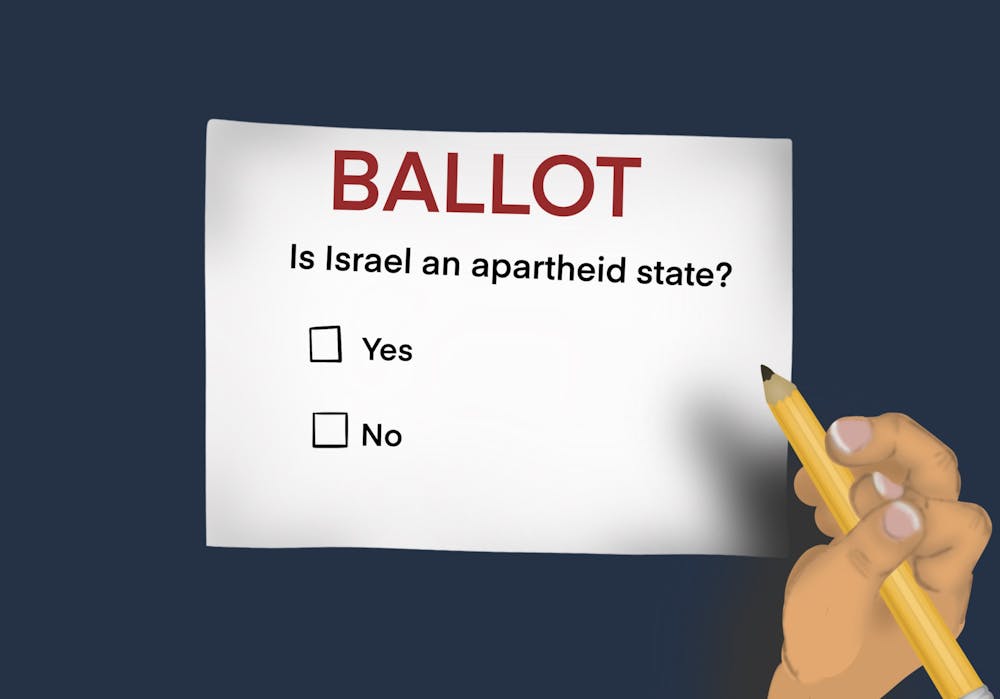Starting Feb. 26, University students will be voting on Referendum 1 which calls upon the University to submit to an audit of its investments and to subsequently divest from “companies engaging in or profiting from the State of Israel’s apartheid regime and acute violence against Palestinians.” The narrative surrounding this referendum has been exceptionally polarizing -– with U.Va. Apartheid Divest using the slogan “Divest from Death.” This seems to imply that we either vote yes, or we must support the deaths of almost 30,000 Palestinians. We can, and should, be outraged by what is happening in Gaza, and we can, and should, be calling for Israel to be held accountable for their war crimes. But the referendum’s simplifications do not do justice to the incredibly complicated nature of this conflict or allow for the possibility of a mutual solution — divestment is a tool for abolition, not a constructive solution.
After Hamas launched a terrorist attack on Israel Oct. 7 — leaving over a thousand dead and taking hundreds hostage — Israel declared war on Hamas and began a massive military operation in Gaza. Palestinians have suffered a disproportionate number of casualties in the subsequent months — while 1,139 Israelis have been killed, more than 30,000 Palestinians have been killed, with Israel claiming that 9,000 of them were Hamas militants. Beyond the casualties, Israel has been accused of committing war crimes including the use of starvation as a weapon. A case has been opened in the International Court of Justice to this effect, but Israel denies the claims and denounces the filing with the ICJ as supporting a terrorist organization.
The disproportionate deaths and accusations of war crimes have led many, including the U.Va. Apartheid Divest coalition, to characterize Israel’s actions as apartheid — and therefore to call for divestment from Israel. Specifically, the referendum calls for us to sell any “stocks, funds, and endowment from companies that profit from any and all acts” of the “State of Israel’s apartheid regime.” This means divesting from the state of Israel itself. The conflict between Israel and Palestine is emphatically complicated, contrary to what UVAAD may say. In fact, it may be the most complicated ongoing conflict of our lifetimes. Any attempt to boil down a conflict with thousands of years of context ignores the important, nuanced perspectives of those on the ground and is an injustice to everyone.
Without considering geopolitics and history, divestment sounds like a potential strategy to address what is happening in Gaza. But this solution ignores the full picture of the conflict and the other players who are similarly complicit in unspeakable violence. While many consider Israel to be a proxy of the West, we must consider Iran’s role in backing Hamas. Iran, a country that has repeatedly called for Israel’s elimination and denies the Holocaust, not only funds Hamas but also other militants in the Middle East including Hezbollah on Israel’s northern border. Yet, the student body has not called for divestment from Iran for their role in the human rights violations committed by Hamas. The referendum paints Israel as the sole villain and ignores the existential threat presented by Hamas’ backer, Iran.
Divestment is far from a new strategy — especially at the University where a successful divestment movement from South Africa occurred in 1990. However, some key differences between South Africa and Israel suggest divestment may not be the right solution today. In South Africa, divestment exerted pressure on South Africa to eliminate their apartheid government system. In Israel, divestment exerts pressure on Israel to stop all operations in Gaza. The key difference here — South Africa was engaging in oppression for profit while Israel is engaging in a fight for their right to exist. Like Palestinians, Jewish people can trace their origin to the region. This means that despite assertions to the contrary, both groups call this land home. In an ongoing war, divestment is a statement on which people should prevail and exist — not a collective solution that considers both histories as legitimate.
The referendum does not encourage a collective future because “Divest from Death” is not a statement which permits nuance. This referendum, and the narrative around it, attempt to simplify our vote into being with the oppressor or the oppressed. You are either against human rights violations or supportive of an apartheid state. This referendum is being presented as the only way to address the atrocities in Gaza, but justice means seeking context and humanity. In order to pave a future of freedom and self-determination for both Israelis and Palestinians, we as students, need to have nuanced, well-informed conversations. Voting no on Referendum 1 is a vote in favor of finding sustainable peace for everyone. It’s a vote affirming that this conflict is complicated. It’s a vote for building a collective future for Israel and Palestine instead of destroying that possibility altogether.
Zoë Jenkins is a third-year student in the College of Arts and Sciences and the School of Education and Human Development School.
The opinions expressed in this column are not necessarily those of The Cavalier Daily. Columns represent the views of the author alone.







